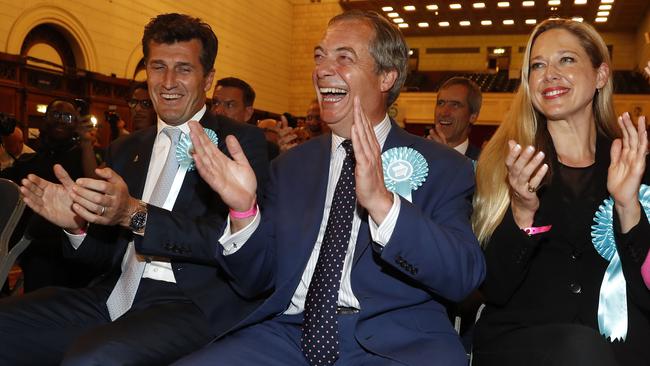EU elections: Voters desert main parties as Brexit divide widens
Boris Johnson will use Nigel Farage’s rout of Tories to pursue leadership and October Brexit.

Britain’s electoral map was set to be redrawn last night as voters deserted the two main parties at elections that have widened the country’s Brexit divide.
Boris Johnson was poised to seize on an expected rout of the Tories in the European elections to press his case to succeed Theresa May and pull Britain out of the European Union come what may on October 31.
Polls put Nigel Farage’s new Brexit Party on course for the top spot in the European poll, although high turnouts in areas that voted Remain in 2016 fuelled Liberal Democrat hopes of making a stunning comeback and driving Labour into third place.
Mr Johnson will use the results to present himself as the best candidate to counter Mr Farage, with a warning that the Tories would never win back lost voters if Brexit were delayed again.
Yesterday Philip Hammond, the chancellor of the exchequer, became the most senior Tory to warn that a Brexiteer prime minister could lose a confidence vote by pressing ahead with a no-deal Brexit. He urged Mrs May’s successor not to gamble that Tory MPs who oppose a no-deal would fall into line if the alternative were to bring down the government. Mr Hammond said that talk of a renegotiation before the end of October was a “fig leaf for a policy of leaving on no-deal terms” as the summer break and the fact that a new European Commission would not be in place until the autumn meant that the timescale was incredibly tight.
He said: “That policy has a major flaw … and that is that parliament has voted very clearly to oppose a no-deal exit. A prime minister who ignores parliament cannot expect to survive very long.”
Matt Hancock, the health secretary, writing in The Times today, challenges his fellow leadership candidates to rule out holding a snap poll to break the deadlock. “A general election before Brexit would be madness. It would be bad for our country and catastrophic for our party,” he says. “That means we have to deliver Brexit through this parliament, whether we like it or not.”
His position dovetails with Mr Hammond’s, as parliament has made clear that it will not back a no-deal. A hard Brexiteer who pushed for one would, in effect, be forcing the country to the polls again.
Michael Gove, the environment secretary, set out his case for the top job yesterday as he sought for a second time to prevent his former ally Mr Johnson from becoming leader. He insisted that he had “evolved” in the three years since, adding that he had had time to “reflect” on the back benches after a disastrous leadership campaign in 2016, during which he abandoned Mr Johnson in order to stand himself.
“I think that I’ve evolved as a politician, but, obviously, we’ll see in the course of the next few days and weeks who people think has what it takes,” he told the BBC in a podcast at the Hay Book Festival.
Labour in-fighting broke out yesterday after Tom Watson, the party’s deputy leader, said that the European results should prompt a campaign to change policy at the party’s conference this autumn in favour of a second referendum.
Mr Watson’s demand that Jeremy Corbyn “find some backbone” drew an angry response from Len McCluskey, the general secretary of Unite, the UK’s largest trade union. Mr Corbyn’s chief union ally accused Mr Watson of being a “poor imitation” of Machiavelli. “If he’s trying to turn Labour members against Corbyn and in his favour, then he’s going to lose disastrously,” Mr McCluskey added.
John McDonnell, the shadow chancellor of the exchequer, acknowledged that the party was set for a “good kicking” but defended its policy that has avoided an outright commitment to holding another EU referendum in the face of pressure from grassroots members.
“It was a hard road to follow. But someone had to be there and say ‘Can we bring the country back together again?’” he said. “And it would have been easy to go to one side, go to the Remain side and ignore all those people who voted Leave — that’s not the nature of our party.
“We are the party that is trying to bring people back together again. That’s been difficult electorally for us in these elections, of course it has. But now we have got to move on.”
Across Europe there were gains for populist and right-wing nationalists as established centrist parties lost out. In France an increased turnout boosted Marine Le Pen, the far-right leader, to victory over President Macron, who has billed himself as the saviour of the European Union.
Matteo Salvini, the leader of Italy’s ultra-nationalist League, said “change was in the air” as he secured the largest share of the vote, on 28 to 31 per cent, according to a television poll.
Germany’s coalition was struggling after poorer-than-expected results for Angela Merkel’s conservatives, on 28 per cent, down from 35.4 per cent five years ago.
The Times


